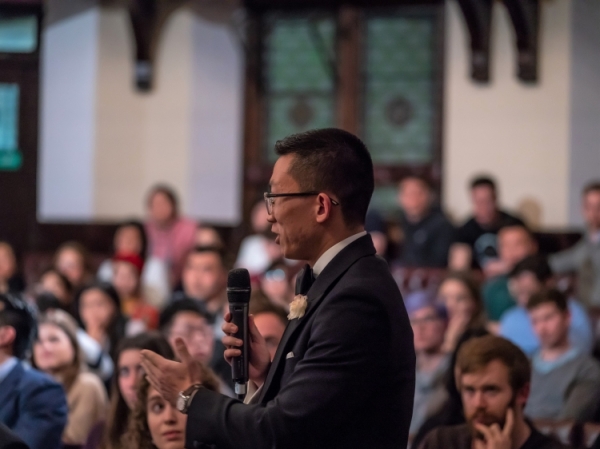
In a world where 2.5 billion people own a smartphone, any information or knowledge is easily one tap away. However, this also means each individual is imprisoned in their online filter bubbles, a state of ideological isolation introduced by internet activist Eli Pariser in 2010. Web algorithms cherry-pick and provide news that people already agree with in their perfectly curated feed on social media to generate views, and therefore profit. So in a world where beliefs are only being strengthened with low tolerance towards different views, how do we dare to disagree?
Ewha Voice took a journey to the University of Oxford and Cambridge, both renowned for their prosperous debating culture. The first edition of the series gave the history and benefits of the tutorial system where students learn in small discussion settings. For the second issue, we took a visit to Oxford Union and Cambridge Union, the oldest and most prestigious university student debating societies in the world.
These societies have several features in common. Each term, they both hold formal debates every Thursday evening, where 200 to 600 people usually show up. Membership is not limited to students as the debate chamber is open to all university members including professors. Finally, the membership fee for both unions is around 200 pounds, but it is subject to change yearly. Once you sign up, the membership is for life.
On Feb. 6, Ewha Voice attended Cambridge Union’s formal debate on the motion “This House Believes China is the New Imperial Power in Hong Kong” and Oxford Union’s debate on the motion “This House Believes that we are the architect of our own demise,” the following week.
Ewha Voice would like to remind readers that the trip to the UK took place before COVID-19 was declared as a pandemic by the World Health Organization (WHO) on March 11.
Cambridge Union, a forum people argue as equals
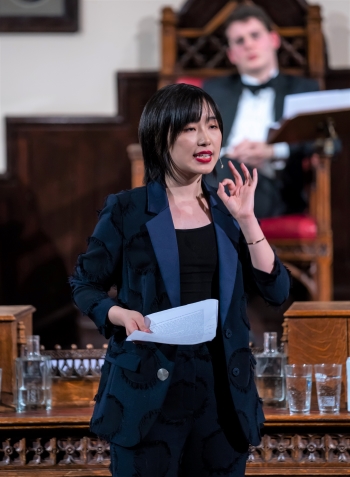
Cambridge Union is a debating and free speech society in Cambridge that was founded in 1815. For more than 200 years, it has been entirely run by students who carry out events to defend and preserve free speech. Currently, the Standing Committee, which is the union’s primary managerial body, consists of 13 members.
A formal debate on the motion “This House Believes China is the New Imperial Power in Hong Kong” was held at Cambridge Union Debating Chamber on Feb. 6. Gabriel Barton-Singer, president of Cambridge Union and a graduate student studying modern British history, served as the Chair. Alongside Barton-Singer, Alycia Leach, vice president of Cambridge Union and a third-year undergraduate majoring in history, was present to take the minutes.
For the Hong Kong debate, Cambridge Union invited Martin Lee SC JP, a Hong Kong politician and barrister, and Joshua Wong, a student activist and politician from Hong Kong, to speak in favor of the motion. Both Lee and Wong were unable to present themselves in the chamber and therefore participated by live link. As for Wong, he has been under a travel ban by the Hong Kong court since last August due to organizing and taking part in unlawful assemblies.
As for the opposition side, Victor Gao, a Chinese international relations expert and translator, and Evan Fowler, a writer and researcher focusing on Hong Kong and China, were invited. Two first-year students also joined the debate panel with Isaac Fung speaking on the proposition side and Margaret Zheng speaking on the opposition side.
“Alongside professionals, we have two students, Issac Fung and Margaret Zheng, who got their slots by open audition,” Barton-Singer said in an interview with Ewha Voice. “The union tries to cultivate the idea that undergraduates of this university are as entitled to have original opinions to formulate, deliver, and argue as people who are experts. By putting people who are studying and those who are well renowned on the same side, we show that they are arguing as equals.”
As the second speaker of the proposition side, Fung delivered his argument on how China is the new imperial power in Hong Kong. According to Fung, China’s unprecedented imperialism is an entirely new program by the Communist Party against the identity of the Hong Kong people, democracy, and freedom. He elaborated on the nine-month protest that took place in Hong Kong last year in which two million people marched against the extradition bill and clashed with riot police as the government cracked down on the protests. In relation to the 2019 Hong Kong protests, Ewha Voice previously covered the #StandwithHK movement spread throughout Ewha campus last November. http://evoice.ewha.ac.kr/news/articleView.html?idxno=10204
After Fung finished his speech, Zheng entered the debating floor ready to refute what Fung said.
“We have heard from Fung a very sound speech that vividly pictured the police brutality that occurred in Hong Kong protests,” Zheng said. “This persuasive speech of Fung has forced me to change the sequence of my speech. I am going to directly challenge Fung’s assumption that China’s imperialism is impeaching Hong Kong’s democracy and that democracy is the ultimate goodness of Hong Kong. I do not think democracy is the ultimate perfection or paradise that can solve the fundamental problems Hong Kong faces today like the hierarchical social inequality and housing problems.”
Going back to the origin of the motion, Zheng first pointed out that China’s power is not new since China is a continuing long lived civilization. Secondly, this power cannot be termed imperialism because legally Hong Kong Special Administrative Region is part of China. Therefore, the power of China is exerted by a civilization trying to retake control of part of its own land lost during colonialism.
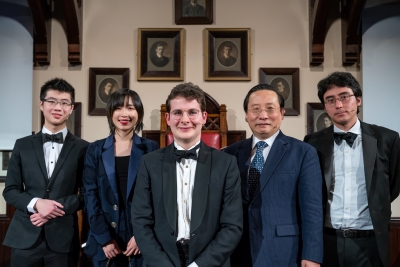
Upon saying those words, a point of information was raised from the audience inquiring Zheng whether she thinks Communist China is a good representation of civilization. Like so, members in the audience were highly encouraged to ask questions to the speakers on the floor.
“Debating is central to the functioning of the civilized society. Although the youth should have deference to expertise, we should not simply follow the opinions of specific elite groups,” Barton-Singer articulated. “Instead, we should hold opinions of our own and state those views. Doing so is a person’s right as an individual and it is my obligation as the president to create such an open atmosphere within the union. It is not that everyone can hold their own opinions; everyone must.”
How to break free of the filter bubbles – Oxford Union Style
Oxford Union was founded in 1823 when freedom of speech of students was restricted in Oxford. Due to that reason, it was set up independent of the university and amongst colleges as a debating forum. Debates were initially held in a library until the debating chamber was built in 1857. From then on, the tradition of Thursday night debates has been held every night except during the two world wars. Oxford Union continues to live up to its reputation as one of the most prestigious student debating societies attracting international celebrities like the cast of Game of Thrones, Conan O’Brien, and Psy from Korea to their chamber.
On Feb. 13, Ewha Voice attended a formal night debate in Oxford Union on the motion, “This House Believes that we are the architect of our own demise” (Tech Debate). Before the event, we sat down in the Members’ Bar with the vice president of the union Beatrice Barr from St. Peter's College.
“People are so used to being told what to think about public figures, national issues, and politics," Barr said. “The union gives people a unique chance to actually figure out what they would think if they were not hearing it through a filter of what everybody else is telling them. For example, last term, we had a debate about how we should respond to the climate crisis and another debate about impeaching Donald Trump. There are obviously two sides on these issues, but we are increasingly hearing only one of them. I think this is partly because politics have become divided into a generational way.”
Barr’s remarks speak the truth. In The Dying Art of Disagreement, Bret Stephens, an American journalist known for his contrarian worldviews, claims the polarization between generations is electronic and digital as people increasingly inhabit the filter bubbles that agree with their ideological affinities. According to the Pew Research Center, American politics has become more polarized than ever due to this reason. Opinions are often facts in disguise, carefully hand-picked by our favorite media outlets.
However, according to Barr, in Oxford Union, even those with firm beliefs may watch a debate and come out with more complex and different ideas.
Formal Debate ‒ How do we disagree better?
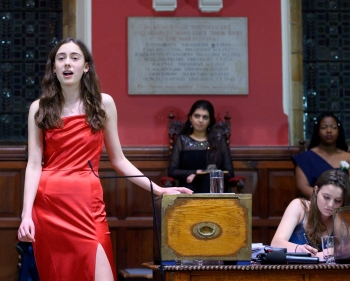
The Tech Debate was opened by a student speaker Rochelle Moss from Oriel College for the proposition. During the entire debate, student speakers sit alongside high-profile speakers with life-long experience in the field. For instance, Lindsay Herbert, a guest speaker on the opposition side, is an author of internationally acclaimed Digital Transformation, as well as a co-chair for the BIMA Tech Council - the UK’s largest tech community. It can be an intimidating moment, but this is why students have a week to prepare their speech.
The hour-and-a-half of heated debate that followed included a massive amount of information and arguments carefully crafted into six speeches ping-ponging with each other. Starting from light topics such as free Skype calls easily connecting the world, to heavier issues on mass surveillance in the UK, each time the floor switched, so did the audience's perspective. The debate marked its end with Professor Michael Wooldridge, head of the Department of Computer Science at the University of Oxford in the opposition side, disregarding Elon Musk’s famous warnings about the future of AI by concluding that “they are science fiction and that’s what they are. Fictions.”
However, not every debate flows in Oxford Union-style where one speaks and the other answers. For instance, there is a saying that goes, “It’s hard to win an argument with a smart person, but it’s damn near impossible to win an argument with a stupid person.” So how do we cope with people that simply won’t have a shift in view? This was a tricky question, but Olly Boyland, a student speaker who just delivered his first speech in Oxford Union tonight, had a clever answer.
“I once read a book saying if there is someone that has such a strong opinion that they refuse to budge without providing any evidence, you need to keep asking why,” Boyland recalled. “The person will eventually have to come down to some basis for which they got such an opinion. Keep asking why and you can then challenge the foundations of [their opinion].”
“It is such an iconic thing to speak at the Oxford Union. It is an amazing opportunity and also informative. We both previously went to debating workshops where we were able to talk with experts and improved our debating skills,” Moss said.
When asked about the future of Oxford Union, Barr replied, “I want to make sure that we have important conversations and that we do not get celebrities to speak at the union for their fame,” with photos of past speakers of the Union behind her including Anna Wintour and Morgan Freeman. “I hope for debates that make people interested and excited and make them change their minds about things.”
Full videos of the formal debate can be watched online on the Oxford Union YouTube channel. https://www.youtube.com/user/OxfordUnion
https://www.youtube.com/watch?v=T28nWl-iFMs&list=PLOAFgXcJkZ2zq1_30YqjV1jy5VN2V2t9e
It can’t be one uniform and all suits: Talking about the Greta Effect with Simon Clark
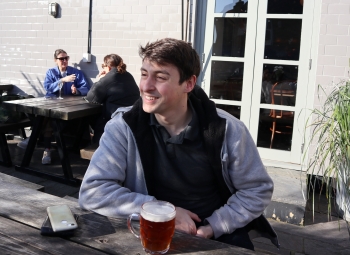
Simon Clark is a full-time YouTuber with over 266 thousand subscribers as of April 2020 and a science communicator connecting bridges between the public and science related topics. He majored in Physics at Oxford from 2009 to 2013 when he started his YouTube career as a student. He is currently a PhD student studying Atmospheric Physics at the University of Exeter. On Feb. 8, Ewha Voice met with him in London to talk about being a full-time Youtuber, reading in British culture, the Greta Effect, and more.
What inspired you to create a YouTube channel and be a full-time YouTuber as a student?
When I was applying for Oxford, I wanted to know how everyday life would be like at Oxford. University promotional videos would usually show people with very soft focus and ethnically diverse groups chatting together. However, your everyday life is not necessarily going to be that picture-perfect. I went to a state school (public school) and no one there had gone to Oxford and studied physics before. That is why I decided to do a video blog about experiences I wanted to see in the past.
You also talk about your passion for books on YouTube. In South Korea, 48 percent of adults don’t read a single book in a year (Ministry of Culture, Sports and Tourism, Republic of Korea). How did you build your reading habit and what made you continue to read even after secondary school?
It was natural to me because both of my parents are active readers and I grew up in a house full of books. Also, as a kid, I wanted to be an author, so I read and wrote a lot. It’s like meditation; it’s self-reflecting.
It’s interesting how almost everyone we met in the UK answered our previous question that they have been raised to read books and that habit continued to live on. The idea that reading should be encouraged is prevalent all around the world, but which specific part of the British culture do you think encourages people to read for pleasure?
I think it is a middle-class thing. It was a pastime that rich people did that middle-class people followed. There is an obsession in upward social mobility in the British culture that you should be trying to get somewhere higher and your children should be more successful than you. People view education and reading an important part of becoming successful in a higher social class.
You mentioned that you wanted to be an author as a child, and being a YouTuber sounds like it's a similar job that you ended up in. You’re ultimately sharing stories.
That’s right. A lot of what I do is science communication and to me, there is no difference between educating and storytelling. If you want to tell a good story, there are structures and guidelines that you follow like setting a protagonist and antagonist, and they work. So, when I write my videos, I write as if I’m writing a short story or a short film. Maybe one day I’ll be able to write a book, we’ll see, would love to (smiles).
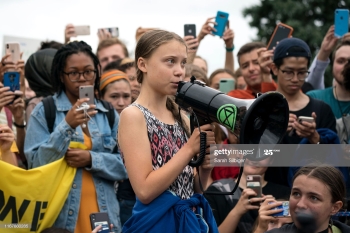
You previously visited Seoul last October for the Korea International Renewable Energy Conference (KIREC) conference. What was that like?
Yes, I was invited by REN21 (Renewable Energy Policy Network for the 21st Century), a global renewable energy community of actors from science to attend KIREC in Seoul and make videos. The conference was about renewable energy in Asia, highlighting how we can accelerate this renewable transition. One thing I remember is REN21, who helped organize this conference, had real problems recruiting Korean youth representatives because Korean organizers didn’t want young people in the conference. Instead they wanted people from the energy department or professors from universities. I know age is a huge thing in Korea and that they respect the elder people. But they also tend to not question what older people say.
That is partially true, strict hierarchy set by age is often a barrier to efficient communication. Hearing phrases like, “How dare you talk back to someone older than you,” is not uncommon and that really discourages the younger person from speaking up, especially in office settings. So, how did the story end? Were there no youth representatives in the conference?
They had one panel with one schoolgirl, and there were about five people that watched it – in that huge conference. I was one of them. In the opening ceremony, there was the Mayor of Seoul, Energy Minister, and everyone was an old man apart from that one schoolgirl. The group photo was her in her school uniform and all suits.
It is definitely ironic so few youth representatives were allowed to speak in a conference about future and renewable energy.
That is why a young activist like Greta Thunberg is so important. It’s the world of the younger generation that would be messed up in the future if they don’t care. While the people who are in power are only going to see 20 to 30 years of the consequences, we have to live with it for 50 to 60 years. Young people should have a say on what happens to it. Also, youth can be more idealistic, enthusiastic, have energy, and bring momentum to projects – all important characteristics to achieve any sort of social change.

